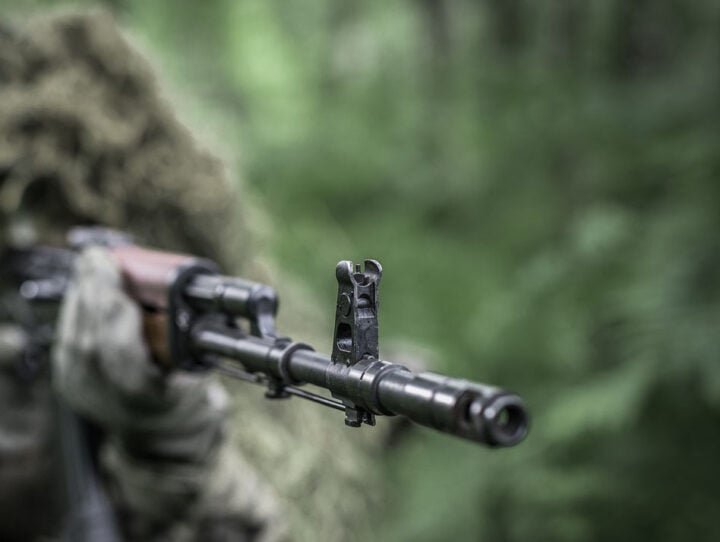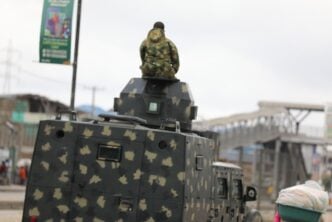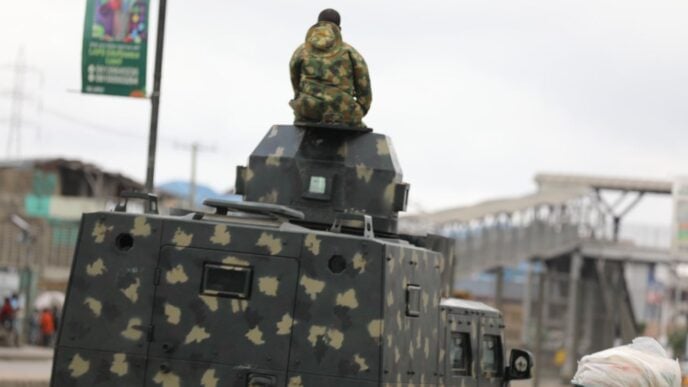File photo of a gunman
Just when we thought there was a lull in the killings across the country and we were beginning to praise the service chiefs, violence has resurged with alarming ferocity. The peace we briefly enjoyed has been shattered by a wave of attacks that have left communities across multiple states reeling in grief and fear.
The recent bloodbath in Plateau state paints a grim picture of our security situation. Death tolls continue to rise as search teams comb through bushes, recovering bodies of those who fell victim to senseless violence. In Bokkos Local Government Area alone, 52 people have been confirmed dead, with 31 victims given a mass burial while five underaged children were burned to ashes in Hurti village. Another 11 were killed in Ruwi, four in Manguna, and one in Daffo village.
Governor Caleb Muftwang’s description of these attacks as a “sponsored genocide” aimed at wiping out entire communities should give us pause. When a state governor alleges that armed bandits have seized control of 64 villages, we must ask ourselves: have we lost the war against terrorism and banditry?
Trust our politicians to issue the usual condemnations and calls for calm while communities continue to bury their dead. But what meaningful action follows these well-rehearsed statements of outrage?
Advertisement
The pattern repeats itself across the country with frightening consistency. In March, communities in Ondo, Benue, Nasarawa, and Edo states suffered deadly attacks by suspected armed herders, with approximately 30 people killed. The kidnapping of nine surveyors in Ondo and the abduction of residents in Edo further highlight the audacity of these criminals. Women in Akure took to the streets in protest – but will their voices be heard beyond the immediate news cycle?
In Benue State, suspected armed herders killed at least 15 people in Katsina Ala Local Government Area, invading Utange council ward and proceeding to unleash terror on Kpav, Dikpo, and Imande Gberihwa. The destruction of lives and property worth billions of naira across multiple local government areas in Benue shows the scale of devastation these attacks leave in their wake.
Up north, the situation isn’t any better. In Zamfara State, six operatives of the Community Protection Guards and four local vigilantes were killed in an ambush by bandits. The notorious Bello Turji reportedly killed 11 farmers in Lugu town, Isa Local Government Area of Sokoto State. Three fishermen were murdered by suspected Lakurawa bandits in Sanyinna community, Tangaza Local Government Area. In Kebbi State, sixteen people were killed when bandits attacked Tungan Taura and Tungan Ladan villages.
Advertisement
Even our educational institutions aren’t spared. A 400-level student of the Federal University Birnin Kebbi was abducted while a local resident was shot dead during the attack. Is any place truly safe in Nigeria today?
Perhaps most concerning are the remarks by Governor Babagana Zulum of Borno State, who insists that renewed Boko Haram attacks and kidnappings occurring “almost on a daily basis without confrontation” signal that Borno is losing ground.
When a governor who has been supportive of military operations admits setbacks in the fight against terrorism, we should all be worried.
The killing of two Chinese nationals in Uturu, Abia State, adds an international dimension to our security woes, potentially damaging foreign investment prospects in a country desperate for economic revival.
Advertisement
Let’s be clear: this resurgence of violence shouldn’t be happening. The service chiefs led by General Christopher Musa had shown promise, with a noticeable reduction in killings following their appointment. So we know they can deliver results when properly motivated and resourced.
I completely agree that they need to take on this new challenge with renewed vigour. They must end these killings or at least reduce them to the barest minimum. The current situation is simply unacceptable.
However, let’s address the elephant in the room. Some of these attacks wouldn’t be successful without the collusion of deviant elements within our security architecture who sympathize with these bandits and terrorists. How do bandits get information about troop movements? How do they know when to strike? The answers to these questions point to sabotage from within.
All efforts must be made to identify these saboteurs in the military and security agencies, and they must be flushed out immediately. No security strategy can succeed when the enemy has informants within your ranks. This internal cleansing is long overdue.
Advertisement
Come to think of it, should we still be debating the formation of state police in 2025? I don’t think so. The federal security agencies are clearly overwhelmed. The argument that governors might abuse state police no longer holds water when communities are being wiped out while we debate semantics.
The truth is that our current approach to security isn’t working. We need a comprehensive overhaul – from intelligence gathering to rapid response, from community policing to military operations. We need to leverage technology, improve coordination between security agencies, and most importantly, address the root causes of these conflicts.
Advertisement
Let’s stop the blame game and focus on solutions. The service chiefs need to revisit their successful strategies and adapt them to counter this new wave of violence. The government must provide adequate resources and political will to support security operations. And as citizens, we must remain vigilant and cooperate with security agencies.
The killings must stop. Nigeria deserves better than endless cycles of violence and halfhearted responses. Our people deserve to live in peace, without fear of being attacked in their homes, farms, or schools. It’s time we demanded more from those entrusted with our security.
Advertisement
Views expressed by contributors are strictly personal and not of TheCable.









